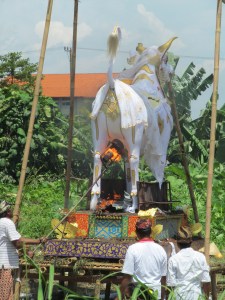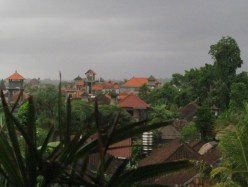
Most days I wake naturally about 6:30 am (2:30 pm the previous day Pacific Standard Time). The sound of roosters is frequent, regardless of the time of day. Roosters are often in small round bamboo cage baskets by the edge of the road. Apparently this is to desensitize them to loud noises and sudden disturbances so that they perform better in cockfights. These fights are simultaneously a part of the religion and technically illegal.You might see a man washing his cock by the side of the road late at night in the U.S., but I assure you it’s a different thing here in Bali.


Geckos are similarly omnipresent. I have discovered their name is onomatopoeic for the sound they make. Some are quite large;all are walking over the walls and ceiling. These small lizards eat pesky insects, so who can complain?

Dogs are quite common, though not kept in the same be-sweatered and organically fed way now fashionable in urban USA. Judging from appearances as you pass by on the street, many range from very skinny to malnourished. Some unwanted dogs are also driven to certain locations and left to fend for themselves. There are some organizations lobbying for better treatment of the canines; some restaurants donate portions of their profit to the cause.

Frequently sighted are all kinds of trash. Before the advent of petrochemicals, nearly all waste items were organic. For example, food was served on banana leaves; when the meal was over, the ‘plate’ would be tossed into a nearby irrigation canal to eventually drain to the ocean. No problem, right? But as the type of materials has evolved, the habit of tossing trash has remained constant.

We were at a cremation ceremony a few weeks ago, and someone had collect our garbage of soda cans and potato chip bags into a plastic bag. A Balinese woman saw it, threw the bags into the bushes and kept the cans (presumably for a deposit). Even as beautiful offerings of palm, flowers and incense are carefully place everywhere you look, trash of all sorts is being frequently burned, if not dumped in the water. I have taken to the game of playing “Garbage or Incense?” A cliffhanger every time!
The people of Bali are really great. Everyone I’ve met has been warm and gracious. There a variety of visitors, some on vacation, some on a program of study. Many people come here looking for paradise, affordable goods, or a healing from some perceived deficit in themselves. Eat, Pray, Love seems to have stoked that fire. On my less generous days, I feel if I never see another middle-aged white woman wandering wide-eyed and wistful in yoga pants through the streets of Ubud, it will be too soon.

However, even with the stream of visitors beginning back at least in the 1930s (if you don’t count colonial times as a “visit”), the Balinese remain so friendly and accommodating. We are always treated very well as guests. If at a ceremony not knowing where to sit, they will offer a seat for you. Fall on your motorbike? They quickly move to help. Yesterday, our mask teacher told us he’d been up all night with his father at the hospital, and had come to class directly from that experience. Yet he was full of genuine smiles and easy laughter as he shared his knowledge and art with us. I hope to pay these kinds of gestures forward.



I haven’t worn shoes in about a month. Flip flops carry you from location to location, and are removed before entering most places. When I first arrived, I was taking the bemo to and from classes. Well, sort of. The bemo is actually more of a public bus; ours is hired specifically for our group of students.

It was a great education on the nature of traffic in Bali. Traffic keeps to the left here, but that’s the least of the differences. The center line is a little more of a general guideline. Autos, motorcycles and scooters weave with in subtle moment-to-moment negotiations of speed, turns, right of way, potholes, and hanging banyan vines. Vehicles of all sizes may suddenly pass or approach you from any direction, on any side of the line. It’s not as unsafe as it may sound, just structured slightly differently than the more controlled queue format in the States. I never even thought of our traffic this way until witnessing its counterpart.

And a week later, I hired a motor scooter. After a few days of practice, I was set to go! I think my decade and a half of bicycle riding prepared me well—like the rooster by the side of the road, I’m acclimated to large vehicles passing by all of a sudden. It’s really quite nice, and the most efficient way to balance getting to class and seeing the island for myself.

 This trip was made possible in part by a grant from the Regional Arts & Culture Council.
This trip was made possible in part by a grant from the Regional Arts & Culture Council.